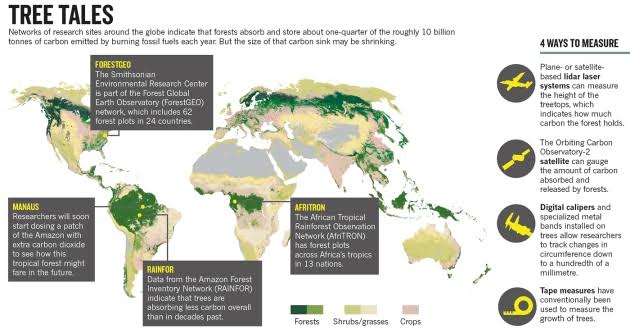 Researchers believe they have solved a mystery that scientists discovered in the 1990s regarding the carbon being emitted by humans into the atmosphere by burning fossil fuels. Three-quarters of the CO2 accumulating in the atmosphere and oceans was accountable and measured; however, the remainder supposedly was captured on land, but where was it going? The problem became known as the “missing sink,” according to a report in Nature Magazine.
The tree growth records are supported by CO2 measurements taken on tall towers at more than 20 sites in North America and Europe revealing that many forests are absorbing more CO2 than they are giving off.
The reason for this is trees require CO2 for photosynthesis and the atmospheric build-up of the gas fertilizes plants and trees making them grow faster. Warming a plant or tree with CO2 lengthens the growing seasons of trees of temperature dependent processes responsible for growth. An international team led by the US Forest Service researchers Yude Pan and Richard Birdsey “concluded that the world's trees had sequestered enough carbon during the period from 1990 to 2007 to account for the entire missing sink4. The hungriest carbon absorbers were the temperate forests, particularly areas where abandoned farmland had given way to young, fast-growing trees. High-latitude boreal forests ate up a smaller amount, and tropical forests, on balance, were not taking up carbon because tropical deforestation released about as much CO2 as forests were soaking up. The team projected that if deforestation was halted, Earth's forests could take up around half of the carbon emitted by human activity, which would substantially slow down global warming,” they said in the report. Is it possible to stop deforestation in time to slow global warming? Deforestation When forests are arbitrarily cleared they emit CO2 back into the atmosphere which is one of the worst repercussions of deforestation contributing to climate change. Deforestation accounts for 11 percent of global greenhouse gas emissions caused by humans. This is more than all the cars and trucks on earth. Estimates say as high as 50 percent of forests have been removed by unsystematic deforestation. Forests are being removed to provide grazing land for cattle, plant agriculture crops, and provide building wood for industry. There are practices in place, however, to control unfettered deforestation. There is a formal document issued by the United Nations called “Forest Principles” outlining acceptable practices; however, adherence to the principles of sustainable forest management is strictly voluntary by nations. Sustainable forest management Sustainable forestry is a practice of regulating forest resources to ensure a balance is maintained between supply and demand of plants and trees in terms of environmental, commercial and recreational in order to maintain viability. Selective logging is a method of selecting certain trees for removal while preserving the woodland ecosystem. This ensures the long-term preservation of tree stands and protects young trees from being harvested too soon. Some trees for the paper industry are grown under the rules of timberland management, which is the systematic land management of trees specifically harvested for paper. It takes 10-20 years for trees to grow large enough for harvesting. During that time they provide a habitat for plants and animals as well as adding oxygen to the earth’s atmosphere. Forest management is a formula where trees are harvested for a variety of reasons including improving the health of the forest; controlling the types of trees that grow on the site; attracting certain wildlife species; providing a source of income for the landowner; producing paper, lumber and numerous other forest products; and improving access to the area for hikers, hunters and other recreational users, according to Maine Forestry. Harvesting methods like clearcut, shelterwood, seed trees, group selection, and single tree selection are all methods used to both maintain and regenerate a forest stand of trees. Each method has its benefits, drawbacks and conditions under which it is the most suitable way to harvest trees. No one harvesting method is ideal for all situations. Since the mystery of the “missing sink” has for the most part been solved, research proving forests are adding biomass can be used to strengthen arguments for preserving forests as a method to slow global warming. Forest management is even more important, but also there needs to be reassessments of land use, as well as rethinking a diet focusing on meat and dairy as protein sources instead of plant-based diets. But that’s a different essay, and more controversial than saving trees. Still, there are statistics lending “plant-based” food for thought. The United Nations Food and Agriculture Organization issued a report citing the livestock sector generates greenhouse gas emissions as measured in CO2 equivalent at 18 percent. It is also a major source of land and water degradation. Resources Nature PNAS Conservation Maine Forestry
0 Comments
Leave a Reply. |
Dava Castillo
is retired and lives in Clearlake, California. She has three grown
children and one grandson and a Bachelor’s degree in Health Services
Administration from St. Mary’s College in Moraga California. On the
home front Dava enjoys time with her family, reading, gardening, cooking
and sewing. Archives
November 2015
|

